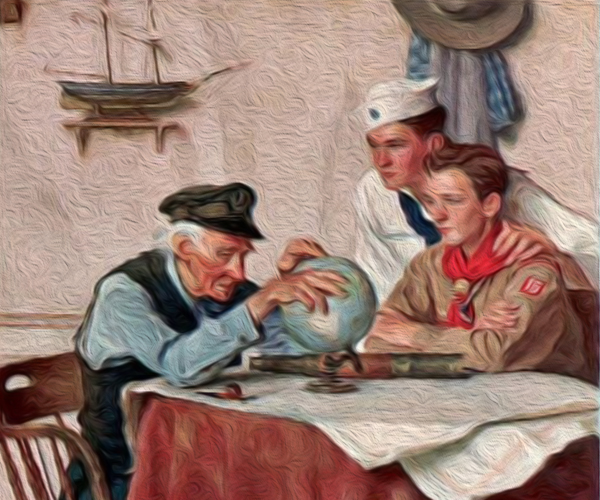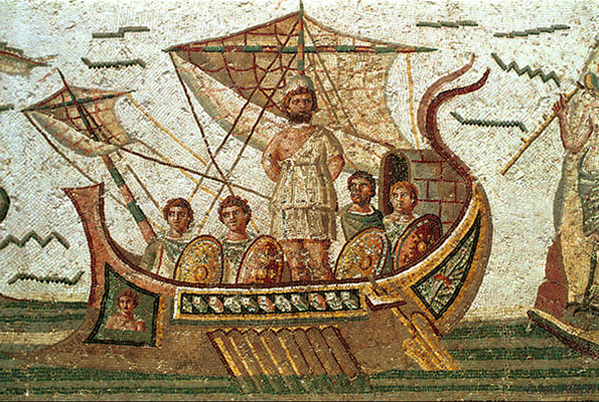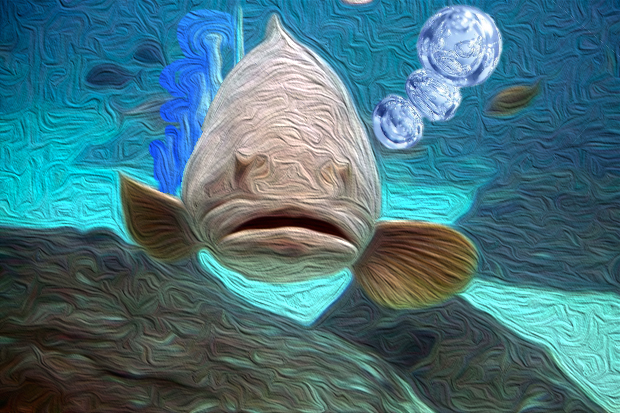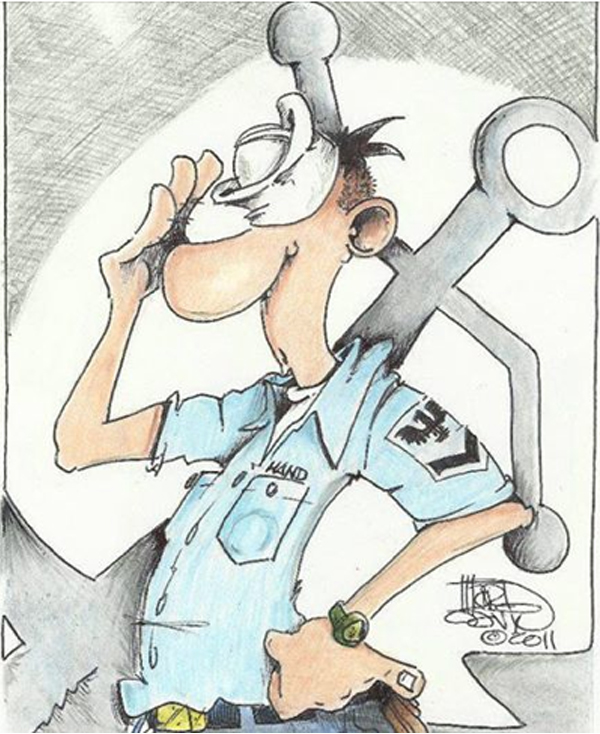
Vesuvius erupts on August 24, 79
Vesuvius erupts: After centuries of dormancy, Mount Vesuvius erupts in southern Italy, devastating the prosperous Roman cities of Pompeii and Herculaneum and killing thousands. The cities, buried under a thick layer of volcanic material and mud, were never rebuilt and largely forgotten in the course of history. In the 18th century, Pompeii and Herculaneum were rediscovered and excavated, providing an unprecedented archaeological record of the everyday life of an ancient civilization, startlingly preserved in sudden death.
The ancient cities of Pompeii and Herculaneum thrived near the base of Mount Vesuvius at the Bay of Naples. In the time of the early Roman Empire, 20,000 people lived in Pompeii, including merchants, manufacturers, and farmers who exploited the rich soil of the region with numerous vineyards and orchards. None suspected that the black fertile earth was the legacy of earlier eruptions of Mount Vesuvius. Herculaneum was a city of 5,000 and a favorite summer destination for rich Romans. Named for the mythic hero Hercules, Herculaneum housed opulent villas and grand Roman baths. Gambling artifacts found in Herculaneum and a brothel unearthed in Pompeii attest to the decadent nature of the cities. There were smaller resort communities in the area as well, such as the quiet little town of Stabiae.
At noon on August 24, 79 A.D., this pleasure and prosperity came to an end when the peak of Mount Vesuvius exploded, propelling a 10-mile mushroom cloud of ash and pumice into the stratosphere. For the next 12 hours, volcanic ash and a hail of pumice stones up to 3 inches in diameter showered Pompeii, forcing the city’s occupants to flee in terror. Some 2,000 people stayed in Pompeii, holed up in cellars or stone structures, hoping to wait out the eruption.
A westerly wind protected Herculaneum from the initial stage of the eruption, but then a giant cloud of hot ash and gas surged down the western flank of Vesuvius, engulfing the city and burning or asphyxiating all who remained. This lethal cloud was followed by a flood of volcanic mud and rock, burying the city.
The people who remained in Pompeii were killed on the morning of August 25 when a cloud of toxic gas poured into the city, suffocating all that remained. A flow of rock and ash followed, collapsing roofs and walls and burying the dead.
Much of what we know about the eruption comes from an account by Pliny the Younger, who was staying west along the Bay of Naples when Vesuvius exploded. In two letters to the historian Tacitus, he told of how “people covered their heads with pillows, the only defense against a shower of stones”, and of how “a dark and horrible cloud charged with combustible matter suddenly broke and set forth. Some bewailed their own fate. Others prayed to die.” Pliny, only 17 at the time, escaped the catastrophe and later became a noted Roman writer and administrator. His uncle, Pliny the Elder, was less lucky. Pliny the Elder, a celebrated naturalist, at the time of the eruption was the commander of the Roman fleet in the Bay of Naples. After Vesuvius exploded, he took his boats across the bay to Stabiae, to investigate the eruption and reassure terrified citizens. After going ashore, he was overcome by toxic gas and died.
According to Pliny the Younger’s account, the eruption lasted 18 hours. Pompeii was buried under 14 to 17 feet of ash and pumice, and the nearby seacoast was drastically changed. Herculaneum was buried under more than 60 feet of mud and volcanic material. Some residents of Pompeii later returned to dig out their destroyed homes and salvage their valuables, but many treasures were left and then forgotten.
In the 18th century, a well digger unearthed a marble statue on the site of Herculaneum. The local government excavated some other valuable art objects, but the project was abandoned. In 1748, a farmer found traces of Pompeii beneath his vineyard. Since then, excavations have gone on nearly without interruption until the present. In 1927, the Italian government resumed the excavation of Herculaneum, retrieving numerous art treasures, including bronze and marble statues and paintings.
The remains of 2,000 men, women, and children were found at Pompeii. After perishing from asphyxiation, their bodies were covered with ash that hardened and preserved the outline of their bodies. Later, their bodies decomposed to skeletal remains, leaving a kind of plaster mold behind. Archaeologists who found these molds filled the hollows with plaster, revealing in grim detail the death pose of the victims of Vesuvius. The rest of the city is likewise frozen in time, and ordinary objects that tell the story of everyday life in Pompeii are as valuable to archaeologists as the great unearthed statues and frescoes. It was not until 1982 that the first human remains were found at Herculaneum, and these hundreds of skeletons bear ghastly burn marks that testifies to horrifying deaths.
Today, Mount Vesuvius is the only active volcano on the European mainland. Its last eruption was in 1944 and its last major eruption was in 1631. Another eruption is expected in the near future, would could be devastating for the 700,000 people who live in the “death zones” around Vesuvius.
History Channel / Wikipedia / Encyclopedia Britannica / National Geographic / Smithsonian / Lonely Planet
Pompeii (YouTube search) 

Understanding Military Terminology - Mensuration
(DOD) The process of measurement of a feature or location on the earth to determine an absolute latitude, longitude, and elevation.
Joint Publications (JP 3-60) (Joint Targeting - Council on Foreign Relations)

The Old Salt’s Corner
“The Odyssey”
BOOK XVI
Meanwhile Ulysses and the swineherd had lit a fire in the hut and were were getting breakfast ready at daybreak for they had sent the men out with the pigs. When Telemachus came up, the dogs did not bark, but fawned upon him, so Ulysses, hearing the sound of feet and noticing that the dogs did not bark, said to Eumaeus:
“Eumaeus, I hear footsteps; I suppose one of your men or some one of your acquaintance is coming here, for the dogs are fawning urn him and not barking.
The words were hardly out of his mouth before his son stood at the door. Eumaeus sprang to his feet, and the bowls in which he was mixing wine fell from his hands, as he made towards his master. He kissed his head and both his beautiful eyes, and wept for joy. A father could not be more delighted at the return of an only son, the child of his old age, after ten years' absence in a foreign country and after having gone through much hardship. He embraced him, kissed him all over as though he had come back from the dead, and spoke fondly to him saying:
So you are come, Telemachus, light of my eyes that you are. When I heard you had gone to Pylos I made sure I was never going to see you any more. Come in, my dear child, and sit down, that I may have a good look at you now you are home again; it is not very often you come into the country to see us herdsmen; you stick pretty close to the town generally. I suppose you think it better to keep an eye on what the suitors are doing.”
BOOK XVI continued ...
~ Homer
Written 800 B.C.E
Translated by Samuel Butler
Table of Contents

“I’m Just Sayin”
“Any person can invent a security system so clever that she or he can't think of how to break it.”
~ Schneier's law

“Thought for the Day”
“There are lots of ways of being miserable,
but there’s only one way of being comfortable,
and that is to stop running round after happiness.
If you make up your mind not to be happy
there’s no reason why
you shouldn’t have a fairly good time.”
~ Edith Wharton

“What I Have Learned”
“Don’t ruin a new day
by thinking about yesterday.
Let it go.”
~ Anonymous

Bizarre News (we couldn’t make up stuff this good – real news story)

Dad shares weird potato trick that cures toddler's tantrums - and it's brilliant
There's a cooking myth - well, there might be a minuscule pinch of truth to it – that says you can fix a salty soup with a potato.
The method is a simple one: you simmer in soup a potato, and the vegetable absorbs some of the excess sodium chloride.
The Potato Method doesn't really work, of course. The carb soaks up a little of the liquid, and therefore salt, but it doesn't fix a broken dinner. Really, you've got to just bulk it out, and add lots more of everything but salt.
Still, cooks are hard-pressed to fix a salty soup...
...Just as parents are in for a rough time when dealing with a toddler having a tantrum. The screams and tears are equally unwelcome.
One dad, who believes resolutely in the Potato Method, uses a vegetable to cheer his three-year-old up. He shared his tactics on Reddit.
Starting out, when his toddler began to whine, the father's reaction was to tell him to “stop being so salty”.
He said, "Then it clicked. My sarcastic dad-brain...", and mused that if it works for soup, it'll work for my kid.
"I found the biggest potato we had and told him that he needs to hold onto this until he changes his attitude," he explained.
"He's too salty and when he's calm and ready to say nice things, he can put down the potato and join us again. And I'll be...it worked. He thought it was so silly and his mood changed.
"At first he was confused and wanted to put it down, but I told him that he will absolutely under no circumstances put the potato down until he's in a better mood to compose himself."
Afterwards, you could make chips.
Mirror (05/26/2017) 

Mr. Answer Man Please Tell Us: How do hormones affect emotions and behavior?
• Serotonin production in the brain is important to prevent depression. Datis Kharrazian’s book Why isn’t my brain working? offers several scenarios that can cause depression and he has examples of cases that were cured of depression. He points out that deficiencies in two major brain transmitters can cause depression: serotonin and dopamine.
Serotonin is produced in the midbrain from the amino acid tryptophan in two biochemical steps. These biochemical conversions require iron, vitamin B6, vitamin B12, niacin, folic acid, and magnesium as co-factors. But you also need the “large neutral amino acid transporter” (LNAA) to transport tryptophan through the blood-brain barrier into the brain.
Dopamine is a neurotransmitter that is produced in the frontal lobes of the brain. It is also necessary for learning. Dopamine is synthesized by the brain from tyrosine, which has to be manufactured in the liver from the amino acid phenylalanine. You need to have a healthy liver to produce tyrosine, which needs to be transported through the blood-brain barrier into the brain; similar to tryptophan this requires the “large neutral amino acid transporter” (LNAA). People with hepatitis, fatty liver, insulin resistance or diabetes may have problems with the LNAA transporter, which can cause dopamine deficiency. But as mentioned earlier they may also have low serotonin because tryptophan was not transported into the brain. This will happen with sugar overconsumption, as insulin resistance develops and affects the LNAA transporter resulting in both low serotonin and dopamine.
• When testosterone is missing in an aging man, this causes low energy, depression, a lack of drive, and erectile dysfunction. You replace testosterone in appropriate doses and all of that normalizes. The reason for that is that many key organs including the brain have testosterone receptors. They need to be activated regularly by testosterone for normal organ function. Women need a small amount of testosterone as well to feel normal.
• Estrogen hormones are the female hormones. If they are normal and balanced by progesterone (from the corpus luteum in the second half of the menstrual cycle) a woman feels well. There is a condition called estrogen dominance where too much estrogen is circulating in relation to progesterone, and these women have the following symptoms:
• Irregular or otherwise abnormal menstrual periods
• Decreased sex drive
• Bloating (water retention)
• Breast swelling and tenderness.
• Fibrocystic breasts
• Headaches (especially premenstrually)
• Mood swings (most often irritability and depression)
If the ratio can be normalized between progesterone and estrogen by the use of bioidentical progesterone, these symptoms disappear and the woman feels normal. Again it is the stimulation of the hormone receptors in just the right manner, which stabilizes the mood and leads to normal body function.
• If thyroid hormones are missing, the person gets depressed and has a lack of energy. Thyroid hormones are stimulating cell function in all the body cells including the brain. Again this is transmitted by hormone receptors in the cells. It is easy for a physician to measure thyroid hormone levels (TSH and thyroid hormone levels) and to rectify the situation by ordering the right amount of thyroid hormones. When thyroid hormone receptor stimulation is normalized, all of the symptoms disappear and the person will feel normal again.
Conclusion
Hormones do not act in isolation, but in concert. Thyroid hormones give the body cells energy. Other hormones add to this and at the end we feel normal.
NOBA Project
• Psychology Today
• Quora
• Science News For Students.org
• Wikipedia
• Womens International


NAVSPEAK aka U.S. Navy Slang
Plastic Fantastic: F/A-18 used in the 1980's.
POD (Plan of the Day): An official document issued by a command that states all activities going on that day, from 0000 to 2359. Also contains the Uniform of the Day. Also called the Possibilities of the Day or Plan of Deception because the plan can change without notice.
POG: (Person Other than Grunt) A term often used by Marine Infantry (Grunts) to refer to anyone who is not them. Specifically anyone in an Admin Field. Originally, "pogue".
Pogey Bait: Candy, sweets, ice cream, etc., so called because such items are used as "bribes" for a pogue.


Just for you MARINE
Rubber Bitch: Name given to the ISO mat or sleeping pad made of a rubber foam-like material. It is used by Marines when sleeping on the ground or other hard surfaces. It is sometimes used during PT (physical training) for calisthenics.
Running Lights: Navigational night lights on a ship; or the small red rectangular Red Patch sewn onto the uniforms of landing support team Marines; a person's eyes.

Naval Aviation Squadron Nicknames
VAQ-134 - “Garudas”
Expeditionary, Naval Aviation Squadron Whidbey Island, Washington - Established June 17, 1969

Science & Technology

Lab on a chip could monitor health, germs and pollutants
• Chip captures individual cells in minuscule gels
• Novel techniques examine solar cells with nanoscale precision
• The seven most extreme planets ever discovered
• 'Indoor GPS' could stop you getting lost - or going hungry – ever again
• Chemists perform surgery on nanoparticles
• Fungus uses zombie female beetles to infect males
• Where cigarette smoking's damage is done... down to your DNA
Phys.org / MedicalXpress / TechXplore

Where Did That Saying Come From?

“Round Robin” Meaning: A distraction from the main issue.
Origin: It comes from fox hunting. A red herring has a strong odour. Hounds chasing a fox could be distracted by the smell of the herring and start following that instead.
In order to identify the derivation of 'Round Robin', we need first to be clear about what the term means. It is now used to refer to things that operate in a rotational manner, like tournaments where each player plays every other, circular letters etc. Long before those contemporary meanings were known of, the term Round Robin had been used to refer to a variety of things. The earliest use was as a disparaging nickname, along the lines of 'sly dog' or 'dark horse'. This dates back to the 16th century and was cited in a work by Miles Coverdale, in 1546:
Certayne fonde talkers... applye to this mooste holye sacramente, names of despitte and reproche, as to call it Jake in the boxe, and round roben, and suche other not onely fond but also blasphemouse names. [fond then meant confounded, or foolish]
Other uses were:
• A reference to Roundheads, that is, the supporters of Parliament during the English Civil War, as in Rump, 1662, which was a collection of scurrilous poems and songs.
• The name of a high-spirited game; for example, in The Works of Mr. Thomas Brown, 1707 - "The noble and ancient recreation of Robin-Robin, Hey-Jnks, [sic] and Whipping the Snake."
• The name of virtually anything that was round in shape. For instance, Angler fish, pancakes and even, in An Epistle to Lieutenant Hamilton, a Scottish dialect poem by Alan Ramsey, 1721, the chubby little garden visitor, the Robin:
Now, now I hope we'll ding the Dutch, As fine as a round Robin, Gin greediness to grow soon rich Invites not to stock-jobbing
The variety of contexts in which the term has been used seems to argue against it being derived from the roundness of robins. It is more likely that 'Robin' was attached to 'round' just as a pleasant-sounding alliteration.
The currently used ' rotational' meaning is independent of all of the earlier uses. This began in the 18th century as the name of a form of petition, in which the complainants signed their names in a circle, so as to disguise who had signed first. This was especially favoured by sailors - not surprisingly, as mutiny was then a hanging offence. The term is recorded in the January 1730 edition of The Weekly Journal:
"A Round Robin is a Name given by Seamen, to an Instrument on which they sign their Names round a Circle, to prevent the Ring-leader being discover'd by it, if found."
The most frequent use of 'Round Robin' now is as the name of tournaments with rounds where everyone plays everyone else. This originated in the USA at the end of the 19th century. The earliest citation I have of that is from the Official Lawn Tennis Bulletin, issued in New York in 1895:
"The so-called round-robin tournament, where each man plays every other, furnishes the best possible test of tennis skill."
Phrases.org.UK

The Strange, Mysterious or Downright Weird

A North Carolina man was arrested last month when police discovered an acre of opium poppies growing in his yard.
The alleged grower, Cody Xiong, is a rare criminal in the United States. Despite a raging opioid epidemic in the country, fields of home-grown opium are rare. The sheriff in the North Carolina case said the discovery was only the second time the plant had been found growing in the United States this year, WBTV reported.
There are two big reasons for this lack of agricultural entrepreneurship: effective U.S. law enforcement and the ease of importing heroin made from opium poppies grown elsewhere, said H. Douglas Wankel, a former assistant administrator and chief of operations in the Drug Enforcement Administration (DEA). Growing enough poppies to make heroin in the United States doesn't make much economic sense compared to importing the drug from more lawless regions, Wankel said. Compared to marijuana, opium poppies are more conspicuous and harder to process, and carry much harsher penalties for growing. [10 Interesting Facts About Heroin]
How heroin is made
Heroin comes from the gum of opium poppies (Papaver somniferum). These flowers aren't difficult to grow, Wankel said. They thrive in temperate climates and are probably native to the Mediterranean, but they can be grown in subtropical and tropical regions as well.
It's undeniably illegal to grow opium poppies with the intent to make opium tea, heroin or any other intoxicating substance. The processing itself is not challenging technically, though it does involve more labor than, say, harvesting marijuana: The grower must use razors to slice the bulb under the poppy plant in the morning and then wait all day for drops of thick, white opium gum to ooze out. This gum is then scraped and processed with water and solvents to extract a morphine solution. Additional chemicals are added to precipitate solid morphine out of this liquid.
This morphine solid is then dried, heated and processed with several other chemical additives to make heroin. Crude processing creates black-tar heroin, which is mostly smoked or snorted. Additional purification steps are needed to make white-powder heroin, which is injectable.
Thorny problem
The problem of heroin addiction goes beyond the drug itself. Overprescription of legal opioid drugs - along with less-than-upstanding doctors and pharmacists who run "pill mills" that prescribe painkillers freely — has helped create widespread addiction to opioids, said Theodore Cicero, a professor of psychiatry at Washington University School of Medicine in St. Louis who has researched opioid abuse. (Though only 4 percent of people who misuse prescription pills go on to use heroin, nearly 80 percent of people who become addicted to heroin had used prescription pills first, according to the National Institute on Drug Abuse.)
Live Science (06/12/2017) 


SONG FACTS

“The Boys of Summer” - Don Henley
Album: Every Picture Tells A Story
Released 1971 
This is about looking back on a past relationship and wanting your ex back - wanting to return to what you had. The first verse depicts how the writer is left behind. His ex has moved on but he hasn't and still hangs onto hope: “But babe, I'm gonna get you back, I'm gonna show you what I'm made of / those days are gone forever I should just let them go but...” At first he is hanging onto hope but then he realizes that he must let go. The “Boys of Summer” could refer to the boys his ex is now seeing, and how they are just summer flings, while he is in it for the long haul.
Don Henley told the NME that he really did see a Deadhead sticker on a Cadillac. Said the Eagles frontman: “I was driving down the San Diego freeway and got passed by a $21,000 Cadillac Seville, the status symbol of the Right-wing upper-middle-class American bourgeoisie – all the guys with the blue blazers with the crests and the grey pants – and there was this Grateful Dead 'Deadhead' bumper sticker on it!”
The opening lyrics (“Nobody on the roads, nobody on the beach”) refer to the California coast as summer turns into fall. It becomes a much quieter place when the weather gets cold.
The title comes from a baseball book by Roger Kahn called “Boys of Summer”. The book is about The Brooklyn Dodgers, who broke the hearts of their fans when they moved to Los Angeles.
The music was written by Mike Campbell, who worked with Tom Petty as a guitarist and producer for many years. He has also written tracks for many songs, including “Refugee”  , “Stop Draggin' My Heart Around”
, “Stop Draggin' My Heart Around”  , and “Don't Do Me Like That”
, and “Don't Do Me Like That”  . Campbell offered this to Petty, but he turned it down and the song went to Henley, who wrote the lyrics. Campbell also played guitar on this and produced it.
. Campbell offered this to Petty, but he turned it down and the song went to Henley, who wrote the lyrics. Campbell also played guitar on this and produced it.
Mike Campbell said about recording this song: “I used to have a 4-track machine in my house and I had just gotten a drum machine - it's when the Roger Linn drum machine first came out. I was playing around with that and came up with a rhythm. I made the demo on my little 4-track and I showed it to Tom, but at the time, the record we were working on, Southern Accents, it didn't really sound like anything that would fit into the album. The producer we were working with at the time, Jimmy Iovine, called me up one day and said he had spoken with Don, who I'd never met, and said that he was looking for songs. He gave me his number and I called him up and played it for him and he called me the next day and said he put it on in his car and had written these words and wanted to record it. That's kind of how it started. Basically, he wanted to recreate the demo as close as we could. We ended up changing the key for the voice. We actually cut it in one key, did the whole record with overdubs and everything, and then he decided to change the key like a half step up or something, we had to do the whole record again, but it turned out pretty good.”
The video for this song was the big winner at the 1985 MTV Video Music Awards, just the second year the awards were held. It won for Video of the Year, Best Director, Best Art Direction, and Best Cinematography
The director was Jean-Baptiste Mondino, a French graphic designer/photographer who had made a video for the song “Cargo de Nuit” by a French singer named Axel Bauer. Mondino sent that video to Jeff Ayeroff, an executive at Henley's label, Geffen Records. Ayeroff flew Mondino to California and had him meet with Henley, who was baffled by the pitch but decided to go with it and let Mondino do his thing.
Speaking about his connection to the song in the book I Want My MTV, Mondino said: “I was living in Paris, and we were into a new era, more modern. But I couldn't refuse to go to LA - it was like a dream. When I got there, I was very disappointed, because there's a big difference between what I saw when I was a kid in the beautiful old Hollywood movies, and what LA's actually about. When I listened to 'Boys Of Summer,' there was something nostalgic - he was looking back, talking about something that he's leaving behind. The '70s were dying.”
Shot in black and white, it was artistic and abstract. When Henley accepted the award for Best Video at the VMAs, he admitted to having no idea what was going on when they shot the clip, but said that Mondino and his crew made “Southern California look like the South of France.” Getting Henley to show up to an awards show was no easy feat - when The Eagles won the Album of the Year Grammy for Hotel California, Henley and the rest of the band skipped the ceremony.
MTV exposure from this song's video raised Henley's profile but cost him a degree of anonymity. With the Eagles, he was tucked away behind a drum kit, and rarely on TV. Only one video was made for his first album - that was “Johnny Can't Read”, and MTV rarely played it. Once “The Boys of Summer” got in hot rotation, Henley found himself suddenly recognizable, which often made him uncomfortable.
Don Henley, official website / Billboard / All Music / Song Facts / Ultimate Classic Rock / Wikipedia
Image: “Building The Perfect Beast (album)” by Don Henley

Trivia
Films with animals in the title:
● What was the name of the 1940 WC Fields film with the name of a bird in the title? “My Little Chickadee”
● What was the name of the 1933 film of a gigantic, prehistoric, island-dwelling ape? “King Kong”
● What was the name of the 1931 Marx Brothers film in which the brothers were stowaways on a cruise ship? “Monkey Business”
● MOVIES/TV SHOWS WITH ANIMALS ON THEIR TITLES. IMDb
A Test for People Who Know Everything
From the Jeopardy Archives Category - “IT'S INTOXICATING” ($800):
Named for a region in Tuscany, this red table wine was once recognized by its fiasco, a straw-covered bottle.
● Answer for People Who Do Not Know Everything, or Want to Verify Their Answer Chianti
Answer to Last Week's Test
From the Jeopardy Archives Category - “BEST” WISHES ($1000):
They're the opening 12 words of “A Tale of Two Cities”
Answer: It was the best of times, it was the worst of times. Gutenberg.org

Joke of the Day
A Blonde & Her Thermos.
A blonde notices that her coworker has a thermos, so she asks him what it's for. He responds, “It keeps hot things hot and cold things cold.”
The blonde immediately buys one for herself. The next day, she goes to work and proudly displays it.
Her coworker asks, “What do you have in it?”
She replies, “Soup and ice cream.”
A Blonde & Her Two Coats.
While her husband was at work, a blonde decided to paint their living room.
After her husband arrives home, he finds his wife lying on the floor in a pool of sweat while wearing a parka and a mink. He asked her what she was doing.
She said, “I wanted to prove to you that not all blonde women are dumb, and I wanted to do it by painting the living room.”
He says that he was impressed at the good job she had done, but asked, “Why are you wearing two coats?”
She replied, “I read the directions on the paint can, and they said, ''For best results, put on two coats!”

“Mad Men” Season 1 (2007 - 2015)
Joan: “He may act like he wants a secretary but most of the time they’re looking for something between a mother and a waitress. And the rest of the time, well…”
Joan: “Go home, take a paper bag and cut some eyeholes out of it. Put it over your head, get undressed and look at yourself in the mirror. Really evaluate where your strengths and weaknesses are. And be honest.”
Don: “The reason you haven’t felt is because it doesn’t exist. What you call love was invented by guys like me…to sell nylons.”
Roger: “Remember, Don…when God closes a door, he opens a dress.”
~ “Mad Men” - “Mad Men Season 1” (2007 – 2015)  Creator: Matthew Weiner - A drama about one of New York's most prestigious ad agencies at the beginning of the 1960s, focusing on one of the firm's most mysterious but extremely talented ad executives, Donald Draper. AMC
Creator: Matthew Weiner - A drama about one of New York's most prestigious ad agencies at the beginning of the 1960s, focusing on one of the firm's most mysterious but extremely talented ad executives, Donald Draper. AMC



























